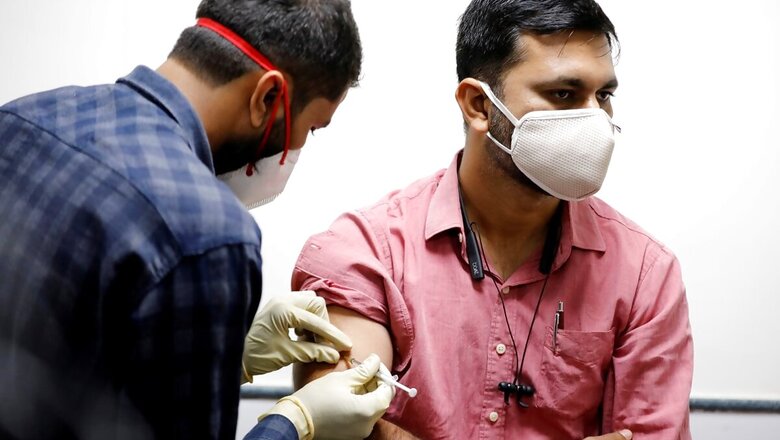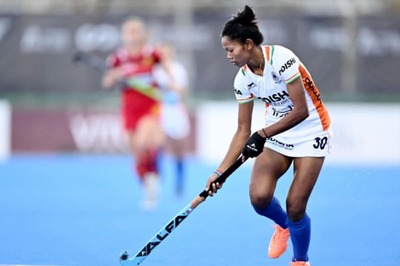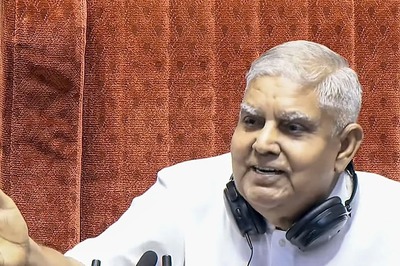
views
When Covid-19 became pandemic with the official announcement of the World Health Organisation, the challenges before each and every country, and the world at large, were to strengthen their healthcare infrastructure and medical facilities. But the ultimate objective was to find its vaccine.
But today when some countries have already developed effective vaccines and many other are in the final stage of development, the challenges are now to ensure equitable access and distribution of vaccines and it is true for India and rest of the world.
In India, nearly 10 million people have been hit by the pandemic, which in terms of number, is the second highest in the world. Efforts are on war footing to develop vaccine and some of them are in the advance stage. Companies like Serum Institute of India, Bharat Biotechnology International Ltd, Biological E. Ltd, Cadila Healthcare Ltd, Hetero Biopharma, Dr. Reddy’s Laboratories Ltd are in advanced stages and many more are working on it. No one for sure can say at this moment how far it is going to be effective because the nature of the Covid-19 virus has been very unpredictable.
According to Seyed Ehtesham Hasnain, Ex-Vice Chancellor, Jamia Hamdard and an eminent immunologist who was Member (2004-14), Scientific Advisory Council to the Prime Minister of India, “SARS-CoV2 the virus that causes COVID-19, is perhaps the smartest pathogen known to humanity. This virus has the ability to infect every single cell of the human body and this explains why though initially it was thought to be responsible for causing respiratory disorders (hence the name SARS), kills more people by infecting other organs of the body – notably the heart (cardio-vascular system), the brain, the kidney, diabetic complications.”
It is with this background global efforts are on to fast-track production of an effective vaccine to control this pandemic. Hasnain adds “Vaccination of an individual will hopefully ensure that the vaccinees do not get into serious complication when exposed to the virus and, over a period of time with increasing number of vaccinated individuals (>60%) in a population, herd immunity will start developing. Scientifically, there is no evidence though that a COVID-19 vaccine will be effective over a period of time given the large number of cases of second infection by the virus within the same individual. Based on data available so far, these vaccines will likely protect anywhere between six months to 1 year maximum and cannot be administered to those 15 years of age or below and also to those with other known allergic response.”
“It would be interesting to see the influence of ‘trained immunity’, after COVID-19 vaccination, on populations which have been exposed to BCG childhood vaccine. India and many other countries of the world, where BCG vaccination is a norm for every child are predicted to have a beneficial effect of ‘trained immunity,” says Hasnain.
On the question of access and equity of Covid-19 vaccines, Shahid Jameel, Indian Virologist known for his research in hepatitis E virus who is currently the Director of the Trivedi School of Biosciences at Ashoka University and was formerly the chief executive officer of Wellcome Trust DBT India, said, “The principle of access and equity is that the vaccine should be easily available to those who need it and are willing to take it. A vaccine should do three things. First, protect those most at risk of infection – healthcare and frontline workers. Second, reduce mortality by protecting those most at risk of dying – in this case the elderly and those with underlying comorbidities. Third, reduce transmission to control the pandemic. Based on this principle, Government of India has released a priority for 30 crore people over the next 12 months. This includes 1 crore healthcare workers, 2 crore frontline workers and 27 crore people >50 years of age plus those under 50 years who have serious comorbidities. This is a sensible plan.”
On the pricing and distribution Jameel adds, “The only way to achieve this in India is to make the vaccine free. Otherwise, those who need it the most are unlikely to get it; those who have the money will get it first. There is no clarity from the Government on this. Who should pay for it? At Rs. 250 per dose or Rs. 500 per person based on government procurement, it would cost Rs. 15,000 crores just in vaccine costs to cover 30 crore people. Access also means that those who are eligible get the vaccine without any hassles. This can be done through prior e-registration based appointments and designating many vaccine delivery points. For example, Delhi has already declared there would be 60 vaccination points in each of the 10 districts (609 total), and 3500 healthcare workers would be deployed across these points to vaccinate people. This is good and needs to be replicated across the country.”
On the modalities, he feels, “Healthcare workers: Government pays for those working in government hospitals. Employers pay for those who work in the private sector. This is not unreasonable as private hospitals have made a lot of money from Covid. Having their employees protected and not transmitting the virus makes good business sense. Frontline workers: Government pays for those working in government sector. Employers pay for those who work in the private sector. The incentive for employers is healthy workers, who will not be absent from work due to Covid. Elderly and co-morbid: Government makes vaccines available through its bulk purchase and pricing, and through government vaccination points. Those below a set income get it free; those above get it at government rates. This would have to be carefully controlled through a transparent e-registration system.”
However, while the jury is out to give a verdict, UK vaccine trial results will reveal whether we will control the worst pandemic the world has ever seen and, which has so far defied human intelligence. Till such time the question whether vaccination will be a hope or a true solution will be any one’s guess.
Read all the Latest News, Breaking News and Coronavirus News here



















Comments
0 comment